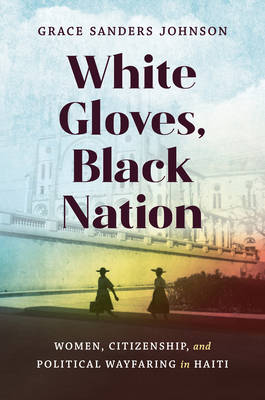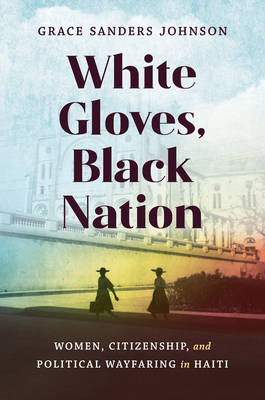
Je cadeautjes zeker op tijd in huis hebben voor de feestdagen? Kom langs in onze winkels en vind het perfecte geschenk!
- Afhalen na 1 uur in een winkel met voorraad
- Gratis thuislevering in België vanaf € 30
- Ruim aanbod met 7 miljoen producten
Je cadeautjes zeker op tijd in huis hebben voor de feestdagen? Kom langs in onze winkels en vind het perfecte geschenk!
- Afhalen na 1 uur in een winkel met voorraad
- Gratis thuislevering in België vanaf € 30
- Ruim aanbod met 7 miljoen producten
Zoeken
White Gloves, Black Nation
Women, Citizenship, and Political Wayfaring in Haiti
Grace Sanders Johnson
€ 49,95
+ 99 punten
Uitvoering
Omschrijving
This ambitious transnational history considers Haitian women's political life during and after the United States occupation of Haiti (1915-34). The two decades following the occupation were some of the most politically dynamic and promising times in Haiti's modern history, but the history of women's political organizing in this period has received scant attention. Tracing elite and middle-class women's activism and intellectual practice from the countryside of Kenscoff, Haiti, to Philadelphia, the Belgian Congo, and back to Port-au-Prince, this book tells the story of Haitian women's essential role as co-curators of modern Haitian citizenship.
Set in a period when national belonging was articulated in philosophies of African authenticity, revolutionary nostalgia, and working-class politics, Grace Sanders Johnson considers how an emerging educated and professional class of women who understood themselves as descendants of the Haitian Revolution established alternative claims to citizenship that included, but were not limited to, suffrage and radicalism. Sanders Johnson argues that these women's political practice incorporated strategic class performance, extravagant sartorial sensibilities, and an insistence on self-promotion and preservation that challenged the exceptional trope of the martyred male revolutionary hero. Bringing her subjects vividly to life, she reveals their politics of wayfaring, moving deliberately if sometimes ineffectively through the radical milieu of the twentieth century.
Set in a period when national belonging was articulated in philosophies of African authenticity, revolutionary nostalgia, and working-class politics, Grace Sanders Johnson considers how an emerging educated and professional class of women who understood themselves as descendants of the Haitian Revolution established alternative claims to citizenship that included, but were not limited to, suffrage and radicalism. Sanders Johnson argues that these women's political practice incorporated strategic class performance, extravagant sartorial sensibilities, and an insistence on self-promotion and preservation that challenged the exceptional trope of the martyred male revolutionary hero. Bringing her subjects vividly to life, she reveals their politics of wayfaring, moving deliberately if sometimes ineffectively through the radical milieu of the twentieth century.
Specificaties
Betrokkenen
- Auteur(s):
- Uitgeverij:
Inhoud
- Aantal bladzijden:
- 328
- Taal:
- Engels
- Reeks:
Eigenschappen
- Productcode (EAN):
- 9781469673684
- Verschijningsdatum:
- 11/04/2023
- Uitvoering:
- Paperback
- Formaat:
- Trade paperback (VS)
- Afmetingen:
- 156 mm x 234 mm
- Gewicht:
- 508 g

Alleen bij Standaard Boekhandel
+ 99 punten op je klantenkaart van Standaard Boekhandel
Beoordelingen
We publiceren alleen reviews die voldoen aan de voorwaarden voor reviews. Bekijk onze voorwaarden voor reviews.









